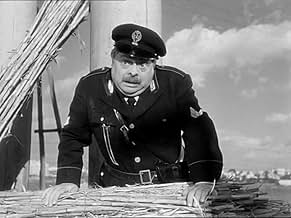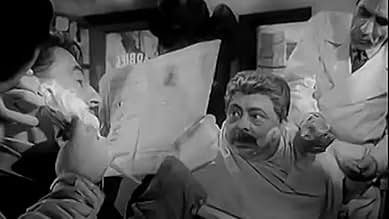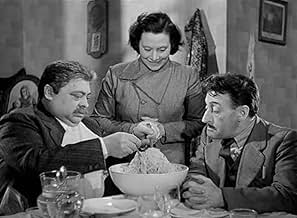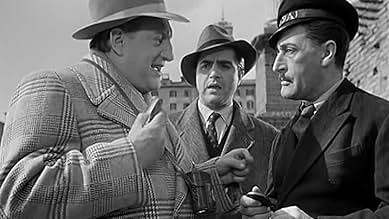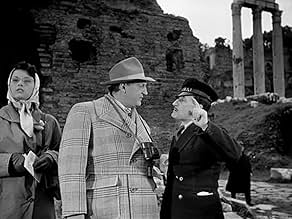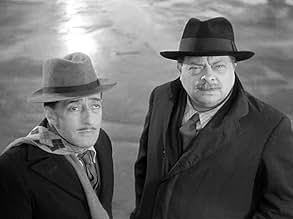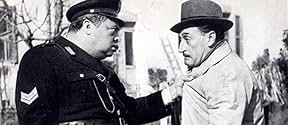Guardie e ladri
- 1951
- 1h 45min
VALUTAZIONE IMDb
7,7/10
1927
LA TUA VALUTAZIONE
Esposito è un ladro che inganna i turisti a Roma. L'agente di polizia, Bottoni, lo sta cercando ma riesce a scappare. Ora i suoi superiori lo informano che se non lo cattura, perderà il lavo... Leggi tuttoEsposito è un ladro che inganna i turisti a Roma. L'agente di polizia, Bottoni, lo sta cercando ma riesce a scappare. Ora i suoi superiori lo informano che se non lo cattura, perderà il lavoro.Esposito è un ladro che inganna i turisti a Roma. L'agente di polizia, Bottoni, lo sta cercando ma riesce a scappare. Ora i suoi superiori lo informano che se non lo cattura, perderà il lavoro.
- Regia
- Sceneggiatura
- Star
- Premi
- 3 vittorie e 1 candidatura in totale
William Tubbs
- Mr. Locuzzo, the Tourist
- (as William Thubbs)
Aldo Alimonti
- Street Boy
- (non citato nei titoli originali)
Riccardo Antolini
- The Janitor
- (non citato nei titoli originali)
Ciro Berardi
- Tavern Owner
- (non citato nei titoli originali)
Luciano Bonanni
- The Second Barber
- (non citato nei titoli originali)
Giulio Calì
- The Beggar
- (non citato nei titoli originali)
Recensioni in evidenza
I have always thought that Italian comedies were far superior to French ones.They all have a tragical side ,which eludes the French directors.
"Guardie e Ladri" is a long chase between a two-bit crook and a cop with a tender heart.The first scene when the lad pretends he is a guide and shows to the naive tourist Colombus's grave and Poppea's bathtub is sheer genius.If it were not enough ,the guide finds an "inestimable " coin,a sesterce from Augustus' time! The depiction of the two families,the cozy house of the cop where the girl plays the piano and the seedy small flat where the runaway packs into with his large family rings true.Actually Monicelli calls the establishment into question:unemployment,poverty,plenty of mouthes to feed ,can we really blame the thief?The last picture is revealing.
"Guardie e Ladri" is a long chase between a two-bit crook and a cop with a tender heart.The first scene when the lad pretends he is a guide and shows to the naive tourist Colombus's grave and Poppea's bathtub is sheer genius.If it were not enough ,the guide finds an "inestimable " coin,a sesterce from Augustus' time! The depiction of the two families,the cozy house of the cop where the girl plays the piano and the seedy small flat where the runaway packs into with his large family rings true.Actually Monicelli calls the establishment into question:unemployment,poverty,plenty of mouthes to feed ,can we really blame the thief?The last picture is revealing.
It's the best comedia of situation you will ever watch! Not just more one stupid and shallow comedia like the most of comedia ranked movies. A world pearl cinema!
It defenetly worth the time spend on it!
Toto most successfully attempts to go one better than Chaplin in this entry in which he cleverly uses his expressive face not only to telegraph laughs but to induce audience sympathy. Set against a war-scarred Rome in the middle of winter, Toto plays a petty thief, living on his wits to provide for his family, who are uncomplainingly making the best of a small, cold-water flat with no heating. The screenplay divertingly contrasts the gaunt, if talkative Toto with excitable, roly-poly but equally loquacious Aldo Fabrizi, playing a fathead police sergeant whose family is housed in comparative luxury.
The catalyst for the plot's ingenious action is provided by that under-rated born-in-Wisconsin actor, William Tubbs, who is wonderfully perfect here in a major role which gently pokes fun at Americans. Not only are all his scenes an absolute howl, but they are most cleverly contrived to increase in intensity as the plot progresses. You will chuckle as Toto leads him on a merry path through the Forum in his introductory scene, gasp with delight when he confronts Toto at the grocery hand-out, split your sides when he gives chase to Toto all over the countryside, and absolutely roll on the floor when he complains bitterly to Fabrizi and Carloni at the police station. This riotous scene, cleverly compounded, when Tubbs finally exits, by a gloriously satiric look at various police regulations, marks the end of the First Act.
With little overt preaching, the Second Act skilfully introduces a note of pathos by contrasting corpulent Fabrizi's obviously well-fed family (plump Ave Ninchi is his wife, lovely Rosanna PodestaHelen of Troy herselfhis daughter) with Toto's scarecrow lot. There are still plenty of laughs, constructively integrated into the action, but these are mainly formulated for Fabrizi (he didn't take a hand in the screenplay to enlarge Toto's part) as he tries various stratagems to keep an eye on his quarry's apartment (including two hilarious run-ins in the barber-shop).
Despite Fabrizi's superlative efforts, however, it is actually Toto who wins the day. Masterfully managing his transformation from figure of fun and slapstick clown to sympathetically harassed (if still resourceful) fugitive, he thoroughly deserved his Best Actor award of 1951.
Attractively photographed by Mario Bava, and with a sprightly score by Cicognini, Cops and Robbers is admirably well-produced by Ponti and De Laurentiis and brilliantly directed by Monicelli and Steno. A must-see movie, if ever there was one!
The catalyst for the plot's ingenious action is provided by that under-rated born-in-Wisconsin actor, William Tubbs, who is wonderfully perfect here in a major role which gently pokes fun at Americans. Not only are all his scenes an absolute howl, but they are most cleverly contrived to increase in intensity as the plot progresses. You will chuckle as Toto leads him on a merry path through the Forum in his introductory scene, gasp with delight when he confronts Toto at the grocery hand-out, split your sides when he gives chase to Toto all over the countryside, and absolutely roll on the floor when he complains bitterly to Fabrizi and Carloni at the police station. This riotous scene, cleverly compounded, when Tubbs finally exits, by a gloriously satiric look at various police regulations, marks the end of the First Act.
With little overt preaching, the Second Act skilfully introduces a note of pathos by contrasting corpulent Fabrizi's obviously well-fed family (plump Ave Ninchi is his wife, lovely Rosanna PodestaHelen of Troy herselfhis daughter) with Toto's scarecrow lot. There are still plenty of laughs, constructively integrated into the action, but these are mainly formulated for Fabrizi (he didn't take a hand in the screenplay to enlarge Toto's part) as he tries various stratagems to keep an eye on his quarry's apartment (including two hilarious run-ins in the barber-shop).
Despite Fabrizi's superlative efforts, however, it is actually Toto who wins the day. Masterfully managing his transformation from figure of fun and slapstick clown to sympathetically harassed (if still resourceful) fugitive, he thoroughly deserved his Best Actor award of 1951.
Attractively photographed by Mario Bava, and with a sprightly score by Cicognini, Cops and Robbers is admirably well-produced by Ponti and De Laurentiis and brilliantly directed by Monicelli and Steno. A must-see movie, if ever there was one!
10f-papa
Guards and Thiefs is probably the best Italian comedy of ever, played by two giants like Totò and Fabrizi. The plot is very simple, bitter and sweet. You must see that movie with the mind of the '50 in Italy, the poor Italy after the war. A small thief is captured by a police man. During the travel to the police station the thief escapes, putting the guard in trouble. He tried to capture him once again using the friendship between his daughter and thief's son. At the end the two families, without knowing anything about the real reason of that interest in the two fathers, become very close. The two families are well described and you pass continually from laughing to tears, especially at the end, when, with tears at his eyes, the policeman takes once again the thief to the prison. Have a good vision and enjoy it.
Lo sapevi?
- QuizVirtually all of the interactions between Totò and Aldo Fabrizi were improvised. More often than not, the directors would simply feed them the first line and let them be in charge of the scene.
- Citazioni
Mr. Locuzzo, the Tourist: Police! Take back your phony coin, your phony coin! I'm going to get you if it takes the rest of my life!
- ConnessioniFeatured in Le ciné-club de Radio-Canada: Film présenté: Gendarmes et voleurs (1956)
I più visti
Accedi per valutare e creare un elenco di titoli salvati per ottenere consigli personalizzati
- How long is Cops and Robbers?Powered by Alexa
Dettagli
- Tempo di esecuzione1 ora 45 minuti
- Colore
- Mix di suoni
- Proporzioni
- 1.37 : 1
Contribuisci a questa pagina
Suggerisci una modifica o aggiungi i contenuti mancanti

Divario superiore
By what name was Guardie e ladri (1951) officially released in Canada in English?
Rispondi
